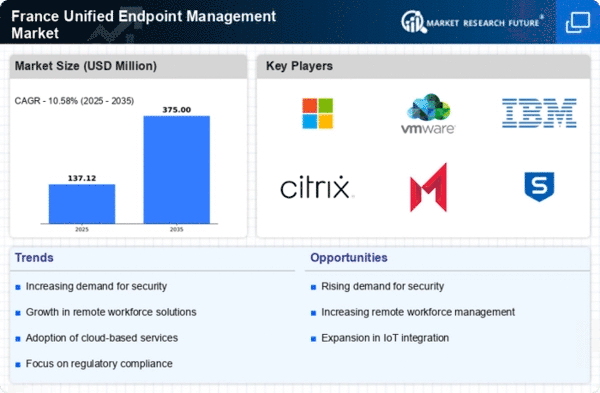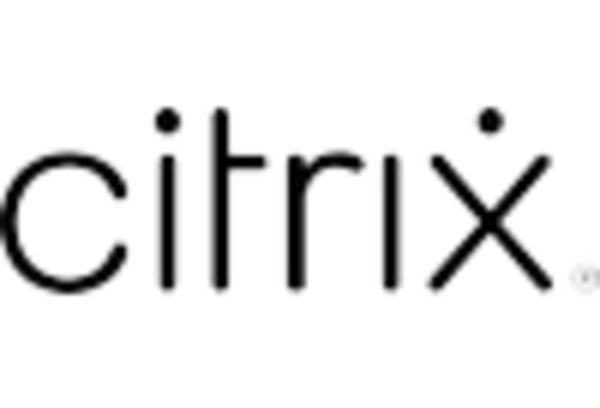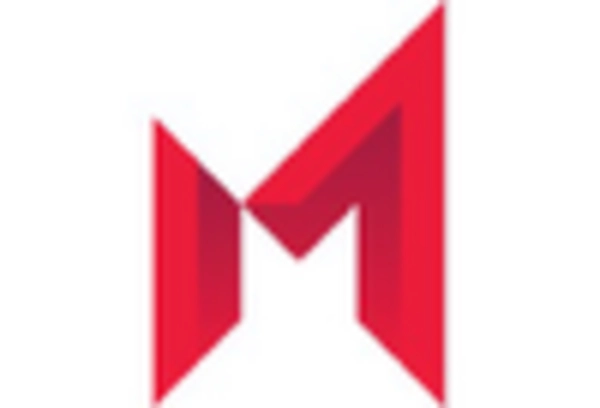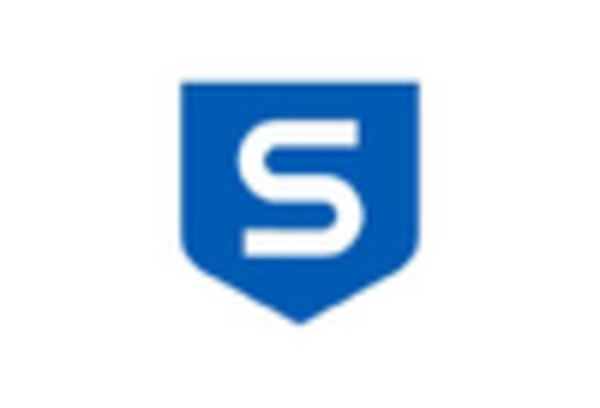Shift to Remote Work Models
The transition to remote work has significantly influenced the unified endpoint-management market in France. As organizations adapt to flexible work arrangements, the need for effective management of diverse endpoints, including personal devices, has become paramount. According to recent studies, approximately 30% of the French workforce is now working remotely, necessitating robust endpoint management solutions to ensure secure access to corporate resources. This shift has led to an increased demand for unified endpoint-management tools that facilitate seamless connectivity and security across various devices. The unified endpoint-management market is thus witnessing a transformation, as businesses invest in solutions that support remote work while maintaining operational efficiency and security.
Rising Cybersecurity Threats
The unified endpoint-management market in France is experiencing a surge in demand due to the increasing frequency and sophistication of cyber threats. Organizations are compelled to adopt comprehensive endpoint management solutions to safeguard sensitive data and maintain compliance with stringent regulations. In 2025, it is estimated that cybercrime could cost businesses globally over $10 trillion annually, prompting French enterprises to prioritize security measures. This heightened awareness of cybersecurity risks drives investments in unified endpoint-management solutions, as they provide centralized control and visibility over endpoints, thereby enhancing overall security posture. The unified endpoint-management market is thus positioned for growth as companies seek to mitigate risks associated with data breaches and cyberattacks.
Increased Adoption of IoT Devices
The proliferation of Internet of Things (IoT) devices in various sectors is significantly impacting the unified endpoint-management market in France. As organizations integrate IoT technologies into their operations, the complexity of managing these devices increases. It is estimated that by 2025, there will be over 75 billion connected IoT devices worldwide, many of which will be utilized in French enterprises. This surge necessitates advanced endpoint management solutions that can handle the unique security and management challenges posed by IoT devices. The unified endpoint-management market is thus evolving to accommodate this trend, offering solutions that ensure secure connectivity and management of a diverse array of endpoints, including IoT devices.
Growing Demand for Cost Efficiency
Cost efficiency remains a critical driver for the unified endpoint-management market in France. Organizations are increasingly seeking solutions that not only enhance security but also reduce operational costs. By consolidating endpoint management processes, businesses can achieve significant savings in IT expenditures. Reports indicate that companies can reduce endpoint management costs by up to 30% through the implementation of unified solutions. This financial incentive is prompting many French enterprises to invest in unified endpoint-management tools that streamline operations and improve resource allocation. The unified endpoint-management market is thus benefiting from this trend, as organizations prioritize cost-effective solutions that deliver both security and efficiency.
Regulatory Compliance Requirements
In France, stringent regulatory frameworks such as the General Data Protection Regulation (GDPR) are driving the unified endpoint-management market. Organizations are required to implement comprehensive data protection measures to comply with these regulations, which has led to a growing demand for endpoint management solutions. The unified endpoint-management market is responding to this need by offering tools that enable organizations to monitor, manage, and secure endpoints effectively. Compliance with GDPR mandates can result in fines of up to €20 million or 4% of annual global turnover, making it imperative for businesses to invest in unified endpoint-management solutions. This regulatory landscape is likely to continue shaping the market as companies strive to avoid penalties and protect customer data.
















